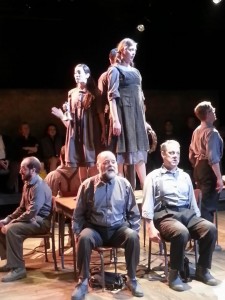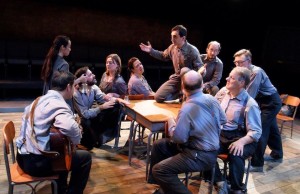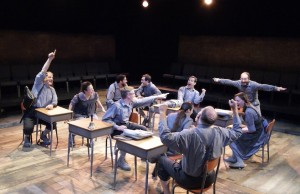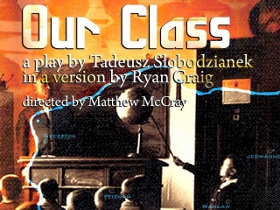SO MANY ATROCITIES IN ONE EVENING
When stories appear which elucidate the carnage during WWII, many look to heaven and ask, “Why?” But the script and execution of Our Class, about a true-life European massacre, are so rife with problems that you now have other reasons to clench a fist to the sky with the same question.
Tadeusz Slobodzianek’ Our Class details the horrendous carnage of Jews by their gentile neighbors in Jedwabne, a city in German-occupied Poland on July 10, 1941. The overwritten, oversimplified, slanted script (the English version by Ryan Craig) apparently owes substantial debt to the work of Jan T Gross’ provocative 2001 book Neighbors, which upended years of established suppositions about what actually happened in that city: Until the book’s publication, the murders had been publicly  and plausibly attributed to the Nazis, yet there is now incontrovertible evidence that it was Polish Catholic villagers who brutally murdered their Jewish counterparts. The most harrowing aspect of the play is the latter half of Act I, which details the brutal beatings, rapes, and murders around the town square – as well as the insidious burning of 1,600 souls in a kerosene-drenched, thatched-roof barn.
and plausibly attributed to the Nazis, yet there is now incontrovertible evidence that it was Polish Catholic villagers who brutally murdered their Jewish counterparts. The most harrowing aspect of the play is the latter half of Act I, which details the brutal beatings, rapes, and murders around the town square – as well as the insidious burning of 1,600 souls in a kerosene-drenched, thatched-roof barn.
Unfortunately, the lead-in to the massacre begins with an extraordinarily cursory kindergarten introduction to village life (which tries but fails to explain the seeds of anti-Semitism), and ends with the ongoing lives of classmates who either perpetrated or survived the heinous event. A thesis can be written about the many, many egregious playwriting errors, but here are two. First, characters speak in declamatory, first-person narratives (and I’m paraphrasing here): “I hid behind the fence, peering at the beatings, holding my breath. I ran to the house of a friend,” etc. The playwright also serves up sketchy, glib dialogue when the one-dimensional characters do speak with each other.
Second, especially in the unnecessary second act, there is repetitive banter meant to hammer home themes of “Never Again”; one character who had moved to America prior to the bloodbath has a grueling, lengthy monologue in which he recites the names of seemingly dozens of his descendants (and I’m paraphrasing here): “My daughters Ethel and Lucy and Fritz and Alex! My grandchildren Efram and Ralph and Frida and Charlie and Norman and Arnold and Frank! And my great- grandchildren Herbert and Greg and Bobby and Marsha and Peter and David and Schlomo and Sylvia and Sonia and Masha and Spike’¦” Ad infinitum. Ad nauseum.
grandchildren Herbert and Greg and Bobby and Marsha and Peter and David and Schlomo and Sylvia and Sonia and Masha and Spike’¦” Ad infinitum. Ad nauseum.
Equally confusing in this 3-hour endurance test through an 80-year history is that there’s no mention of WWII’s outbreak, or the partition of Poland by Germany and the Soviet Union. Overall, the script is an overweight generalization of a complex era, an obvious indictment and condemnation which skirts context and the underlying forces which may have led to such an atrocity. As Miller proved with The Crucible, the audience will have a greater sense of the mind-boggling horrors which humans are capable of committing if the dramatic reconstruction is properly contextualized.
Son of Semele Ensemble and director Matthew McCray inexplicably attempt to bring Our Class to life, but the interminable, grueling production now on at Atwater Village Theatre only serves to highlight the script’s problems. An extraordinarily game cast of 10 work their butts off, memorizing a truckload of lines and blocking. They sing incongruous folk songs, play instruments (amateurishly), and are clearly supportive of each other, but they are left to flounder with overwrought, underdeveloped characterizations. And if it’s not bad enough that the playwright has  characters break the fourth wall to explicate history, it is embarrassing to have actors speak directly to us when our eyes are often at half-mast or completely shut.
characters break the fourth wall to explicate history, it is embarrassing to have actors speak directly to us when our eyes are often at half-mast or completely shut.
McCray takes full advantage of the in-the-round space (which only has one row of chairs), but he monotonously stages the piece with mind-numbing results, tediously using the classroom desks and chairs as building blocks for a multitude of scenes. It’s a yeoman’s task for this play to work on any level, but even with a slew of designers on board, there is little attempt to heighten the stakes (I wondered as the name-spouting monologues were delivered, why there were no other cast members also reciting names – or music or multimedia or something to interrupt the strained droning of a well-intentioned actor).
In staging a script which is more fat than roast, McCray bit off more than he could chew with this one.
photos by Kim Chueh
Our Class
Son of Semele at Atwater Village Theatre
scheduled to end on April 28, 2013 EXTENDED to June 9, 2013
for tickets, visit http://www.sonofsemele.org

